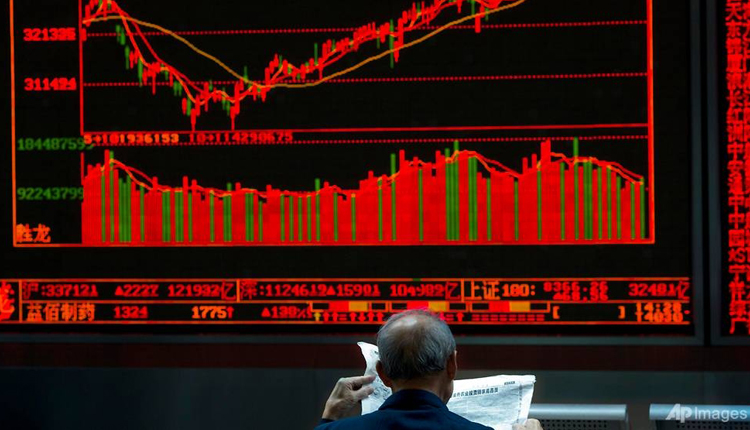Asian markets were higher in Tuesday afternoon trade, as U.S.-Japan trade talks kicked off and the Bank of Japan chief flagged risks of increasing trade protectionism to the global economic growth outlook.
The Nikkei 225 in Japan rose 0.25 percent in afternoon trade, with shares of index heavyweights Fast Retailing and Softbank Group advancing about 1 percent each. The Topix index, however, slipped 0.1 percent.
Shares of Japanese telcos Softbank Corp and NTT Docomo both jumped more than 3 percent each after the latter announced price cuts that were smaller than expected.
Shares in mainland China recovered from their earlier slump to rise by the afternoon, with the Shanghai composite gaining 1.11 percent and the Shenzhen component adding about 0.55 percent. The Shenzhen composite also advanced 0.310 percent.
Resilience in the property market would provide some cushion for China’s economy as sectors such as manufacturing and retail are hit by trade war tensions and weak consumer confidence, Reuters reported.
Average new home prices in China rose faster in March as compared to February, according to Reuters’ calculation of data released by the National Bureau of Statistics on Tuesday.
In Hong Kong, the Hang Seng index added 0.63 percent.
Over in South Korea, the Kospi was fractionally higher, as shares of Asiana Airlines surged beyond 16 percent.
The top shareholder of Asiana Airlines, Kumho Industrial, said on Monday it would sell its entire stake in the debt-ridden carrier to keep it afloat, Reuters reported. That followed weeks of financial uncertainty after the carrier failed to win auditors’ sign-off on its 2018 financial statements, which triggered warnings of credit ratings downgrades, according to the Reuters report. For its part, Kumho Industrial saw its stock jump beyond 9 percent.
In Australia, the ASX 200 was 0.33 percent higher, as most sectors advanced.
Bank of Japan Governor Haruhiko Kuroda said “some sort of protectionism” around global trade was the “most serious risk involved in the global economy,” in an interview with CNBC that aired on Monday.
Kuroda’s comments come as the U.S and Japan kicked off trade talks in Washington on Monday. U.S. President Donald Trump has made it clear he is unhappy with Japan’s $69 billion trade surplus with the United States and wants a two-way agreement to address it.
Japanese Economy Minister Toshimitsu Motegi told reporters that he had a “frank and good exchange ” with U.S. Trade Representative Robert Lighthizer, with the two set to meet again on Tuesday, Reuters reported.
Meanwhile, China and the U.S. appear to be close to striking a trade deal.
The Chinese made unprecedented proposals on forced technology transfers, a sticking point in the negotiations, Reuters reported earlier. U.S. Treasury Secretary Steven Mnuchin said Sunday that the U.S. is open to facing penalties if it doesn’t comply with an agreed-upon trade deal. However, Mnuchin also said Monday the two sides still have lots of work ahead of them.
“Even if we are seeing and hearing a deal announced anytime soon, we would rather think this is not a game changer because most of this is already (priced) in,” Tuan Huynh, chief investment officer and head of of discretionary portfolio management, emerging markets at Deutsche Bank Wealth Management, told CNBC’s “Capital Connection” on Tuesday.
“We would even expect maybe investors would use this as a trigger point to take some profits,” he said.
Overnight on Wall Street, the Dow Jones Industrial Average shed 27.53 points to close at 26,384.77, while the S&P 500 slipped 0.1 percent to finish its trading day stateside at 2,905.58. The Nasdaq Composite closed 0.1 percent lower at 7,976.01.
Aussie dollar tumbles
The Australian dollar changed hands at $0.7148 after touching an earlier high of $0.7175. The moves came following the release of minutes from the Reserve Bank of Australia’s April monetary policy meeting.
In its meeting minutes, the Australian central bank said an interest rate cut would “likely be appropriate” in the event that “inflation did not move any higher and unemployment trended up.”
The U.S. dollar index, which tracks the greenback against a basket of its peers, was at 96.942 after seeing lows around 96.8 yesterday.
The Japanese yen traded at 111.94 against the dollar after seeing highs below 111.2 last week.
Oil prices declined in the afternoon of Asian trading hours, as international benchmark Brent crude futures fell 0.27 percent to $70.99 per barrel and U.S. crude futures shed 0.14 percent to $63.31 per barrel.
Source: CNBC


